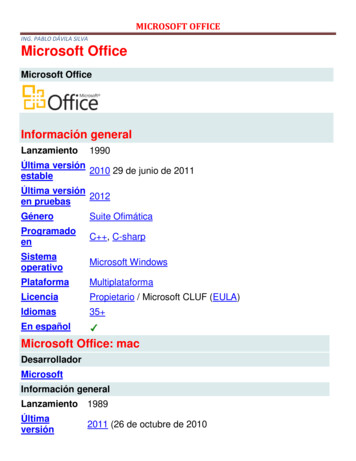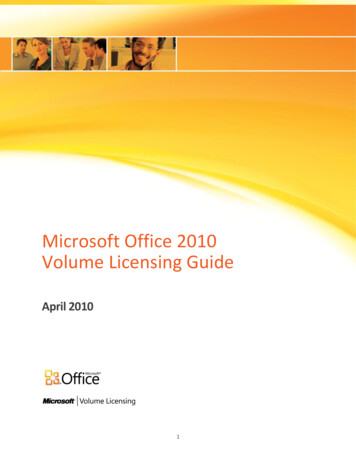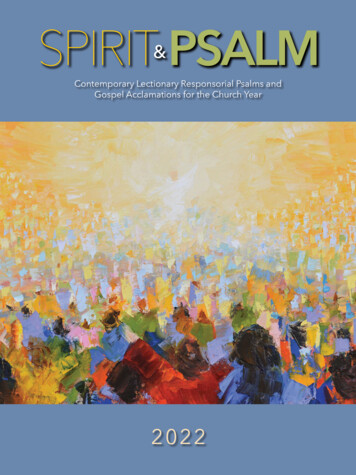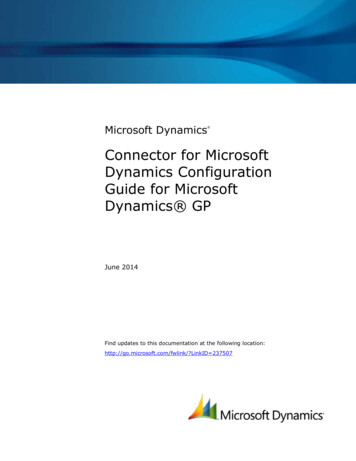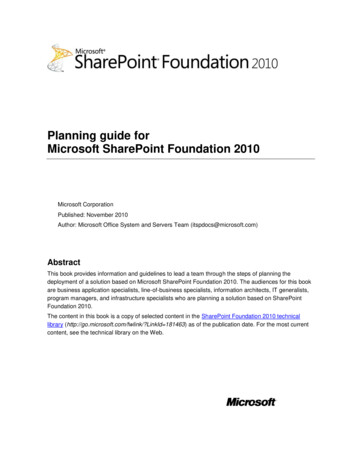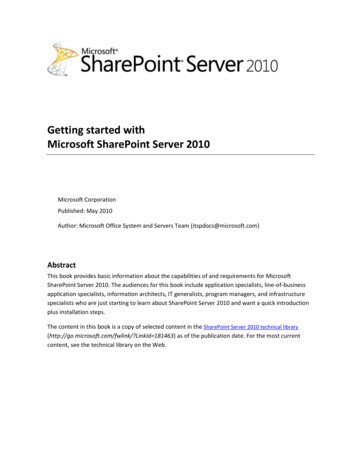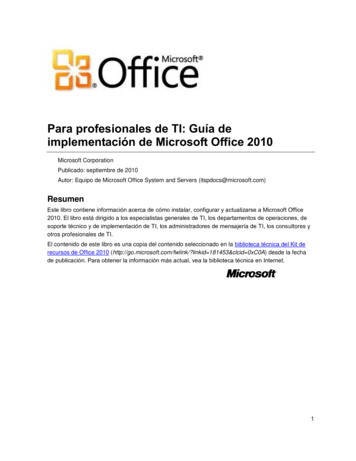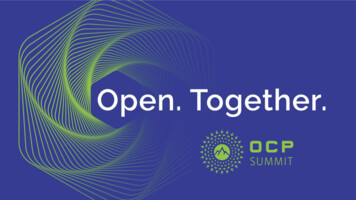
Transcription
Annual ReportOCP 2010
His Majesty King Mohammed VI.
Message fromthe ChairmanOCP is celebrating its 90th anniversary this year. 90 years of a historyrich with accomplishments of which we are all proud at OCP. 2010 wasa particular success from this point of view.S uccess at home. We are proud to have contributed to the wealth and wellbeing of our country. Through our exports, which scored a strong upsurge thisyear. Through our engagement as a corporate citizen with farmers and smalland medium sized businesses in the Kingdom, as well as with the people in thecities that host our activities. And last but not least, through our commitmentto ensure our activities respect and preserve the environment, as sustainabledevelopment is a real corporate culture at OCP.S uccess on the global scene. In 2010, we substantially increased our globalmarket share of phosphate and derivatives. We launched a major program todevelop our industrial capacity and strengthen our leadership. At the sametime, we are very conscious of our responsibility vis-à-vis food security for humanity. A consciousness that leads us to expand our openness to the world andshare our knowledge and know-how, particularly with farmers of other countries through South-South cooperation. A first major project was launched inIndia this year. Others will follow. Particularly in Africa, a continent with strongagricultural potential to which OCP pays special attention.S uccess within our Company. OCP greatly values its human capital. Ourwealth as well as our future lie in the hands of the thousands of skilled anddedicated men and women staffing our Group. Their entrepreneurship, enthusiasm and discipline, further enhanced by “Iqlaa”, our business transformation program, are at the core of the Group’s successful general modernization,as well as its national and global achievements. They, indeed, are behind ouradvances in upgrading our facilities, developing our R&D and expertise, optimizing the implementation of our financial means, as well as our technicalprocesses and management techniques. At OCP, human capital is consideredthe Group’s very soul, the driving energy of its success and influence.M ostafa TerrabChairman and Chief Executive Officer
Contents9The OCP GroupCorporate profileGovernanceOCP in figures – 20101. STRATEGY16Global strategyMarket leadership andworld food security24MarketsOCP consolidatesits international positions30IndustryOCP’s industrial developmentprogram launches44FinanceEnsuring availability of resourcesfor the Group’s development program51AnnexesConsolidated financial statements
2. SUSTAINABLE HUMANDEVELOPMENT56Sustainable developmentAn integral part of OCP’s culture70Social responsibilityAt the forefront of national excellence80International commitmentIndia and Africa, two major OCP targetsfor effective South-South cooperation84Human capitalCollective intelligence at theservice of performance
8Annual report 2010OCPMap of OCPmain sites in MoroccoMining poolsSPAINChemicals plantsPhosphate portsTangiersOujdaRabatCasablancaEl JadidaJorf COSmaraLaayouneBoucraaDakhlaMAURITANIA
9Corporate profileAglobal leader in the phosphate and derivatives market, OCP operates on five continents and has the largest phosphatereserves in the world. With over 90 years experience in mining and 45 years in chemicals, theGroup offers one of the largest ranges of rockfor various uses. The biggest exporter of phosphate rock and phosphoric acid in the world anda major exporter of phosphate fertilizers, OCPplays a central role in the regions where it isestablished and directly employs nearly 20,000people. The Group thus ranks as one of the leading employers in the Kingdom.The number one industrial company in Morocco, OCP substantially contributes to thenational economy’s development through its exports (24% of the country’s exports). The company also provides unfailing support to Moroccanagriculture in general and small and mediumsized companies in particular, whose development significantly impacts the Nation’s wealth.Our three product categoriesOCP masters the entire phosphate value chain:mining and enriching of raw phosphate, processing of raw phosphate into a semi-finished liquidproduct, phosphoric acid, and manufacture offinished products by concentration and granulation, or by purification of this acid: fertilizersand purified phosphoric acid. R aw phosphate. Raw phosphate is minedfor its phosphorus content. Measured in percentage of P2O5 (phosphorus pentoxide), thephosphorus content indicates the ore’s quality,which varies from 5% to 45%. Below 30%, whichrepresents the major part of the mined ore, rawphosphate undergoes an initial treatment in theway of washing, drying and dry enrichment. P hosphoric acid. It is obtained by reactionof sulfuric acid with the phosphate calcium. Theaverage content of the intermediate productthus obtained after concentration is 52% P2O5.As for purified phosphoric acid, it is intendedfor food and industrial uses. F ertilizers. OCP produces four types of fertilizers from phosphoric acid: DAP (the mostcommon fertilizer), TSP (an all-phosphate fertilizer), MAP (a binary product with two fertilizingelements: phosphorus and nitrogen) and NPK(made up of three ingredients, nitrogen, phosphorus and potassium).Our assetsT he diversity of its products allows OCP to offer a customized service to its clients. Its leaderposition gives it the means to innovate. Its ethicsand value system gives it a sense of responsibility vis-à-vis the needs of global agriculture.Sustainable developmentI n addition to preserving the environment,sustainable development is in OCP’s vision across-sectional management principle: aspectsof sustainable development are systematicallytaken into account in all of the Group’s projects,whether human, industrial, managerial or of national interest.OCP, driving force of thenational economyT he Group plays an important economic andsocial role in the five regions of the Kingdomwhere its three mining and two industrial centersare located. It creates wealth and jobs in theseregions by subcontracting through a dense network of companies that it often helps create.
10OCPAnnual report 2010Governance: the Group’s management structuresOCP’s internal governance is structuredaround two management bodies: The Executive Management Committee (EMC) brings together the keyfunctional and operational managersunder the CEO.The EMC is OCP’s central decision-makingbody.The Chairman and CEO arbitrates anddecides.T he Group Committees (GRC) arebodies that prepare or take decisionsfor the EMC on key business processes in the framework of the authoritygiven.I n order to promote cross-sectional collegialand proactive operation, the GRC is structuredaround key company processes and makes upone of two major components of OCP’s internalgovernance, the other one being the EMC. Functional and operational entities are associated tothese committees for processes connected totheir area of expertise.T he Group Committees are the following:Pricing, Business Steering, Budget and Performance, Partnerships, Human Capital, InvestmentPolicy and Industrial Projects, Investment Policyand Real Estate Projects, Risk.The Board of Directors (BoD)It decides on the orientations of OCP’s activities andoversees their implementation. The Board handles allmatters relating to the efficient running of OCP. It dealswith the Group’s business, within the scope of the rightsexpressly granted to shareholders and within the limitsof the company’s business purpose.Board members are: Minister of Energy, Mines, Water and the EnvironmentMinister of Foreign Trade.Minister of Industry, Trade and New Technologies. Secretary of State to the Interior Minister.Secretary General of the Ministry of Economy and Finance.Secretary General of the Ministry of Agriculture andMaritime Fishing, Department of Agriculture.Secretary General of the Ministry Delegate to the PrimeMinister, in charge of Economic and General Affairs.Secretary General to the Ministry of Foreign Affairsand Cooperation.Director of Treasury and External Finances Direction.Chairman and CEO of the Banque centrale populaire.Chairman and CEO of OCP.
11Amar DrissiExecutive Vice-President,OperationsMohamed El KadiriGeneral SecretaryEXECUTIVE MANAGEMENT COMMITTEEMhamed IbnabdeljalilExecutive Vice-President,Sales, Marketing and RawMaterial ProcurementMostafa TERRABChairman and CEOMohamed El HajjoujiExecutive Vice-President,FinancialThe Works Council (WC) This committee is made up of:representatives appointed by OCP’s Presidency;two employee representatives elected by all the employees permanent representatives;two union representatives appointed in accordancewith legal provisions by the most representative union which has obtained the largest number of voicesat the last workplace elections;two designated union representatives, including theSecretary General of each union having signed theCharter for Social Cooperation. Mbarek KarouaExecutive Vice-President,Audit and ControlMeryem ChamiHead of the CEO OfficeAs part of its advisory role, the WC can be consultedon the following issues:structural and technological transformations to becarried out within the Group;the Group’s production strategy and the means of increasing the company’s profitability;the development of social projects for OCP staff andtheir implementation;the social audit, after its official institution by thegovernment authority in charge of Labor;the apprenticeship programs, training-integrationprograms, fight against illiteracy programs as well asstaff in-service training programs
12OCPAnnual report 2010OCP in figures – 20101OCP isthe numberglobalexporter of phosphatesin all forms, of phosphaterock, of phosphoricacid, and a major exporterof phosphate fertilizersValueof exports35.6324%billion MAD, that isof total national exportsExport market shareExported volumesPhosphates in all formsPhosphates in all forms29%35.6%51.3%14.3%Phosphate rockPhosphoric acidSolid fertilizers7.17410.0832.3441.689Mt P2O5Phosphate rockPhosphoric acidMt P2O5Solid fertilizersMt P2O5InvestmentStaffbillion MADpeople.115An ambitious industrialdevelopment program ofwhich the first major projectshave been launched.Mt19,044
13Full perimeterturnoverTotal commercialproduction of phosphates43.51326.6billion MAD*million tonnes P2O5Breakdown by activityMiningChemicalsOther24.9% 74.9% 0.2%Breakdown by marketExport90.4%Breakdown by siteGantour7.1253.713billion MADmillion tonnes P2O5Net profit8.890billion MAD5.2 billion US dollarsCerphos, Ipse (association),Maroc Phosphore, Marphocean,Phosboucraa, OCP InnovationFund for Agriculture, Sotreg,Smesi, Star, Comatam,GPFCE, Imsa, Lejonc & Cie.2.6Production of solid fertilizers(DAP, MAP and TSP)14.420100% owned16.93.997million tonnes P OLocal9.6%SubsidiariesPhosboucraaProduction of phosphoric acidOperating profit* orKhouribga DAP: 2.104 Mt P2O5produced in total at Jorf Lasfar MAP: 0.825 Mt P2O5produced in total at Jorf Lasfar TSP: 0.784 Mt P2O5produced in total at SafiEquity investmentsOther equity investmentsBCP (6.6 %), Comanav(9.06 %), Emaphos (33.33%),Imacid (33.33 %), Prayon(45.31 %), Pakistan MarocPhosphore (50 %), ZMPL inIndia (50 %), Bunge MarocPhosphore (50 %), JESA (50 %).BMCE Madrid (7.5 %),SEPYK (12 %),SIDETSA (25 %),STOZ (35 %).
1
STRATEGY16Global strategy24Markets30Industry44Finance
16OCPAnnual report 2010GLOBAL STRATEGYMarket leadershipand world food securityOCP’s industrial development program,put on track throughout 2010(1), servesthe dual goal of consolidating the Group’sleadership on the global phosphatemarket and reinforcing its commitmentto food security for humanity.OCP’s massive industrial developmentprogram is on track. A program with aninvestment of MAD 115 billion over the2010-2020 ten-year period, of which 75 billionover the next four years. This large-scale undertaking is part of the Group’s strategy to achieveindustrial excellence in three areas: product leadership, cost leadership and industrial flexibility,as major levers to enhance competitiveness.1. Product leadershipOCP is sitting on large phosphate reserves.With a market share of approximately 30% forrock phosphate and 40% for phosphoric acid,the Group is one of the main players in the global phosphates market.( 1 ) Disclaimer: The present document reportsevents occurring, projected or forecast in 2010. Alldates mentioned with no year indication are to beunderstood as referring to 2010.The Group hastargeted a 30%-40%reduction of its costs.However, to fully benefit from the competitive advantage due to volume, OCP is determinedto increase its production of fertilizers, whichamounts to an average 15% of world marketshare. The Group aims at a 40% market share,while sustaining its take of the other productsin the phosphate value chain. This is one ofthe goals of OCP’s industrial capacity development program. At the same time, the Group iscarrying out an intense R&D activity aimed atdeveloping its already extensive range of phosphate derivatives in order to offer products inline with the needs of global agriculture. HenceOCP’s massive investment program aimed at anear doubling of its mining capacity, from 30 to55 million tonnes/pa, and a threefold increaseof its fertilizer production, expected to reach 10Mt/pa of DAP from the current 3.6 Mt/pa.
GLOBAL STRATEGYMarket leadership and world food security17OCP keeps a close watch on thedownstream of the phosphateindustry, particularly on the pricesof agricultural commodities.2. Cost leadershipOCP is geologically privileged with rich oredeposits, and equally privileged geographically,as its mine basins are close to ports with goodinfrastructure. By improving its productivityand industrial processes, the Group is targetinga 30%-40% cost reduction. A major contributionwill come from the two giant pipeline projects(Khouribga-Jorf Lasfar and Gantour-Safi) thatwill transport raw phosphate currently carriedby train. This will drastically reduce transportcosts, as washed phosphate (in the form of pulp)will no longer need drying at the mine as in thecase of railway transportation, neither will ithave to be re-moisturized when reaching thechemical plants for processing. Hence the important energy and water savings.Cost reduction will also come from watermanagement. The Group is investing in usedwater recycling to further develop raw phosphate processing and enrichment, with the aimof reaching a positive water balance by 2015. Onthe chemical plants side, OCP plans to build newseawater desalination units to produce the freshwater needed in the industrial processes.Also contributing to cost leadership is thebusiness transformation program called “Iqlaa”.Launched in April 2009, its ongoing goal is tobe systematically on the lookout for cost reduction opportunities, while building a performance-based culture at all Company levels. Initialresults emerge more than convincing (see boxpage 42).3. Industrial flexibilityA key element in competitiveness improvement in 2010 is the creation of a Business Steeringcommittee, a value-based production management tool. The goal henceforth is not only to satisfy demand but also to sell where the market ismost profitable. The Business Steering committee is the linchpin between the Sales, Marketingand Raw Material Procurement Department, andthe Operations Department, in permanent interaction. This enables a maximization of marginsby optimizing production through choices andtradeoffs of the various products (rock, acid orfertilizer) and qualities.Customer information is crucial to offeringthe right product and successfully managingclient relationship from an operational point ofview. This is the role of Customer RelationshipManagement (CRM). « It is a tool that enablescustomer identification and support, as well as
18OCPAnnual report 2010knowledge of the customer environment; it is avaluable help to proactive decision making, » explains Karim Laghmich, Chief Operations Officerat the Sales, Marketing and Raw Material Procurement Department. To successfully meet marketrequirements, OCP has also created its Marketing Division. « Marketing is a strategic functionthat supports the sales function, » explains Mohamed Belhoussain, head of the Division. « TheMarketing Division will have a thorough, moreglobal view of a situation, while a salespersonwill often have a regional, more limited grasp. »Thanks to itsindustrial flexibility,OCP is in a position toadjust its supply fora better response tomarket requirements.Two events have further contributed to enhancethe Group’s industrial flexibility: the merger in2009 of the Mines and Chemicals Departmentsinto one Operations Department, and the adoption of an integrated and dynamic operating procedure with its counterpart the Sales, Marketingand Raw Material Procurement Department.OCP is thus in a better position to meet thegrowing global demand and to increase its market share. Analyzing various parameters suchas global population growth, changing food requirements, prices of energy and commodities,experts in the main international specializedorganizations – FAO (Food and Agriculture Organization), IFA (International Fertilizer Associ-
GLOBAL STRATEGY19Market leadership and world food securityOCP’s ambitious industrialdevelopment program aims atdoubling its mining capacity andincreasing threefold its chemicalcapacity by 2020. Total capitalinvestment: 115 billion MAD.ation), IFPRI (International Food Policy ResearchInstitute) and others – forecast a 3-3.5% per annum progression in global demand for phosphate fertilizers over the medium to long term.Thanks to its industrial development program,the Group aims to capture at least half the expected increase in global demand for phosphatefertilizers. An increase resulting in additionalproduction capacities of 2-3 million tonnes/pa ofDAP being implemented or planned worldwide.Price volatility makes monitoringa strategic necessityIn recent years, the price volatility that traditionally affects raw materials markets hasreached agricultural products as well. It hasbecome such an international concern that itwas added to the G20 agenda at the Pittsburgh(United States) Summit in 2009. Heads of Statediscussed the impact of this volatility on globalfood security, and decided the issue would beaddressed as a priority at the June 2011 meetingof the G20 agriculture ministers in Paris.OCP is concerned by this volatility as it isliable to affect the price of phosphates. To beprepared to adapt its product supply to marketfluctuations, it is of strategic importance for theGroup to monitor the downstream of its activities. This entails keeping a tight watch on theprices of agricultural commodities (called softcommodities). Actually, it is vital to monitor avariety of aspects liable to impact these prices,such as changes in dietary habits, the state ofagriculture, energy prices, as well as the broader economic environment. And the monitoringshould take place at a global level as well as regional or country level, especially where OCP hasits major customers.With the extent and quality of its reserves,the size and flexibility of its production facilities, and its human capital nurtured on a performance and cost reduction culture throughthe Iqlaa program, the Group is well aware thatit possesses the key means to gain additionalmarket share. However, the Company has implemented two additional equally importantessentials, namely, monitoring beyond its corebusiness and internalising expertise in key related areas.Partnership with leadersto internalize expertiseMining is an industry with highly intensiveneeds in energy, water, infrastructures, logistics
20and engineering. With a development programof the magnitude of OCP’s, projects to be implemented in these areas are of extraordinarydimensions. Controlling costs entails masteringall these different fields outside of the Group’score business. Hence the importance to drawfrom global best practices and internalize theexpertise. OCP is doing just that through partnerships with international leaders in each field.The joint venture with Jacobs is a first and greatillustration.OCP created JESA, a 50/50 joint venture withJacobs Engineering Inc., to learn and benefitfrom a transfer of skills. JESA, a Moroccan company, can then develop and implement its ownprojects in Morocco, in Africa or elsewhere. OCPwill have thereby internalized engineering skills.At the same time, it will have created a businessplatform with its own ambitions.The same is happening in the field of sustainable development, through the Group’s cooperation with Ecology & Environment. E&E is anAmerican leading company in consulting andknow-how transfer in the fields of renewableenergies, eco-building and waste management.2011 should see the reinforcement of this cooperation in various OCP projects.Innovation, key toindustrial excellenceOCP is convinced of the importance of innovation to achieve and consolidate industrialexcellence, which is crucial to the consolidationof its leadership. For this reason, the Goup conducts an intense R&D activity at its various sites(see box page 40). Constantly on the lookout forOCPAnnual report 2010cutting-edge solutions, the Group has initiatedthe 1st International Symposium on Innovationand Technologies in the Phosphate Industry. Theconference, known as Symphos, will take placeearly May 2011 in Marrakech. It is meant as aplatform dedicated to deal with topics related toinnovation in this key sector. It will, in particular, address aspects of economic, environmentaland human development, by comparing experiences and best practices.Several hundred participants are expected toattend the Symphos. And several dozen speakersfrom leading companies in the industry will address topics such as “new products”, “agricultureand fertilization”, “environment and sustainabledevelopment”, among others. « The top playersof the phosphate industry are expected at thisconference, which will also address the industry’s need to migrate from eco-efficiency to ecodesign, in order to fully integrate sustainabledevelopment in its strategies, » said MohamedAmalhay, coordinator of the conference.Beyond the exchange of ideas and experiences, Symphos will be of interest to OCP forother reasons. Given the number and variety ofcompanies taking part, the conference is likelyto turn out to be a haven of partnership opportunities for the Group in many areas related tothe core of its business. Again, OCP addressesthe principle of partnership with a great openness and always the same goals: to implement its projects in these areas;to internalize relevant expertise;to open to these partnerships the scope ofopportunities outside of the Group, by offering
GLOBAL STRATEGYMarket leadership and world food securityA strong illustration of OCP’s attention to matters of globalinterest: in 2010, the Group sponsored for the second yearin a row the World Policy Conference, a forum dedicatedto issues of world governance. CEO Terrab is seen hereon the sidelines of the conference, in a discussion withBan Ki-moon, Secretary General of the UN, and Thierryde Montbrial, General Director of the Institut françaisdes relations internationales and founder of the WPC.services nationally or internationally in their areas of expertise.Global influence beyond phosphatesOwing to the very nature of its business, OCPcannot ignore the issues of agriculture. Becauseit is a direct outlet for its products, but also because, as a supplier of phosphate in all forms,the Group is aware of being a major player in theplanet’s food security. An even greater responsibility considering the large planned increase inits fertilizer production.Among others, OCP is following the progression of what is known as “offshore farms”, apartnership system whereby land is bought orrented in Africa and Asia by foreign States lacking sufficient arable land at home to ensurecurrent or future domestic food needs for theirpopulations. These are contracts involving millions of hectares of farmland traditionally benefiting from little if any fertilization, of which theinvesting States – as well as large agribusinesscorporations – expect consistent yields.Faced with international aid that is strugglingto lift Africa out of food shortages(1), this provision of capital and expertise could be at leastpart of the solution to low crop yields on thiscontinent. In fact, Africa does have a huge agricultural potential, but so far it has not beendeveloped due to lack of infrastructure, marketsand human skills, among others. If certain conditions are met, particularly in some countriesin Africa, this offshore farming could greatly( 1 ) The World Food Program (WFP) estimates at 239 million thenumber of people suffering from malnutrition in Sub-Saharan Africa, that is 30% of the region’s population.The aim is notonly to meetdemand, but alsoto sell on highermargin markets.21
22OCPAnnual report 2010Karim Laghmich, Chief Operations Officer at theSales, Marketing and Raw Material ProcurementDepartment: « The Customer Relationship Management(CRM) is a tool that enables customer identificationand support, as well as knowledge of customerenvironment, to help proactive decision making. »accelerate the growth of the continent’s agricultural production. However, there is a risk thatthe phenomenon turns into a “brown gold rush”attracting major hedge funds totally alien toagriculture.OCP is also keeping an eye on another major problem plaguing agriculture in developingcountries, especially in Africa, namely agricultural subsidies in rich countries. Due to thesesubsidies, food products from rich countriesare imported into the African market at priceswell below local production costs. Thus unableto make a living, African farmers abandon theirland and move to ever growing cities’ slums. Itis clear that the challenge for the continent is tobe competitive and find market opportunities.But it is also clear that if local producers are notsubsidized or protected, African agriculture willbe unable to survive in this unfair competition.The Group intends tocapture at least halfthe forecast increasein global demand forphosphate fertilizers,while preservingits presence onthe other links ofthe value chain.As a global supplier of fertilizers well awareof its responsibilities towards world food security, OCP takes part in many international forumsand conferences on various topics of global concern, particularly those relating to agriculturaldevelopment, an inevitable condition of foodsafety for humanity. Some examples: In April, in Marrakech, the Group organizedthe 1st FMB Africa, bringing together professionals, members of the scientific community and development agencies with an interest in Africa. In September, in Accra (Ghana), it participated as an industrial partner in the 2010 edition of the Africa Green Revolution Forum. In October, in Marrakech, CEO Mostafa Terrab represented OCP at the 3rd edition of theWorld Policy Conference. The WPC was attendedby dozens of statesmen and top internationalofficials around a debate on global governance.Progression ofexport volumesAn increasingshare for valueadded products(in million tonnes)
GLOBAL STRATEGY23Market leadership and world food securitySamia Charadi, OCP’s Strategy and Partnerships Director:« OCP is determined to be involved in the exchangeof ideas, in reflection and in organizing debates inall areas that have an impact on agriculture. » In January 2011, in Mumbai (India), OCPwill attend the 17th Partnership Summit. Amongthe topics to be discussed: “the challenges ofpoverty”, “the necessity for sustainable development”, “the risks threatening global economicgrowth”, “the global financial context”, “the convention on international trade” and “economicdevelopment: necessity and challenges of urbanplanning”.All evidence that the Group’s culture, basedin-house on a philosophy of exchange and onthe dynamics of collective reflection, is also expressed beyond both the borders of the Kingdom and the core of the Group’s business. « OCPis determined to be involved in the exchange ofideas, in reflection and in organizing debates inall areas with an impact on agriculture, » statesSamia Charadi, OCP’s Strategy and 10819905.9495.5531.72419950.8141.5481.0452000Raw PhosphatePhosphoric acid (P2O5)Phosphates in all forms (P2O5)Fertilizers (P2O5)2.16420057.1742.3440.9321.6892010
24OCPAnnual report 2010MARKETSOCP consolidatesits international positionsThe Group’s export sales reboundedsharply after the 2009 market’s steepdecline. A strong recovery reflecting,among other things, OCP’s policy ofmigration towards a product portfolio withgreater emphasis on fertilizers and otherhigher value-added finished products.Demand: Indiaand Brazil, amongthe main driversof its increase.Supply: newproductioncapacities onthe market.Following a significant contraction in 2009due to the credit crunch, demand for fertilizers strongly resumed in 2010. Thisrecovery is part of a broader movement whereagricultural raw materials (soft commodities)registered near price hikes during the secondhalf of the year in reaction to various naturaldisasters (floods in China, droughts and fires inRussia and Ukraine.). High oil prices bear theirshare of responsibility in this rise, as they led tohigher demand for biofuels. This, in turn, contributed to the rise in the prices of soft commodities and thus stimulated the demand forfertilizers, including phosphates.At the same time, the psychological effectsof the 2008 crisis have somewhat tamed speculation in the fertilizer market. And that helpedbring prices back to levels more in line withfarmers’ economic si
CP is celebrating its 90th anniversary this year. 90 years of a history rich with accomplishments of which we are all proud at OCP. 2010 was a particular success from this point of view. Success at home. We are proud to have contributed to the wealth and well-being of our country. Through our exports, which scored a strong upsurge this year.

